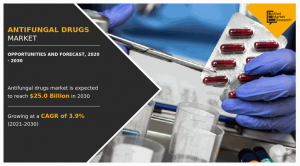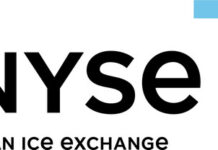
Antifungal Drugs Markets
Antifungal Drugs Market generated $16.6 billion in 2020, and is projected to reach $25.0 billion by 2030, witnessing a CAGR of 3.9% from 2021 to 2030.
PORTLAND, OREGON, UNITED STATES, March 24, 2023 /EINPresswire.com/ — 𝐀𝐧𝐭𝐢𝐟𝐮𝐧𝐠𝐚𝐥 𝐃𝐫𝐮𝐠𝐬 𝐌𝐚𝐫𝐤𝐞𝐭 𝐒𝐭𝐚𝐭𝐢𝐬𝐭𝐢𝐜𝐬 𝟐𝟎𝟑𝟎 –
The global Antifungal Drugs Market generated $16.6 billion in 2020, and is projected to reach $25.0 billion by 2030, witnessing a CAGR of 3.9% from 2021 to 2030. Antifungal drugs are medicines used to treat infections caused by fungi, which are microscopic organisms that can cause a variety of diseases. These drugs work by either killing the fungi or preventing them from growing and reproducing.
There are different types of antifungal drugs, including topical creams and ointments, oral tablets and capsules, and intravenous (IV) medications. The specific type of drug prescribed will depend on the type of fungal infection and the severity of the symptoms.
Some common antifungal drugs include fluconazole, terbinafine, clotrimazole, and amphotericin B. These drugs may have side effects, such as nausea, vomiting, and liver damage, so it’s important to follow your doctor’s instructions carefully and report any adverse reactions.
It’s also important to note that antifungal drugs are not effective against all types of fungi, and some fungal infections may require other types of treatments, such as surgery or the use of other medications. If you suspect you have a fungal infection, it’s important to seek medical advice from a healthcare professional.
𝐑𝐞𝐪𝐮𝐞𝐬𝐭 𝐚 𝐒𝐚𝐦𝐩𝐥𝐞 𝐂𝐨𝐩𝐲 𝐨𝐟 𝐭𝐡𝐞 𝐑𝐞𝐬𝐞𝐚𝐫𝐜𝐡 𝐑𝐞𝐩𝐨𝐫𝐭: https://www.alliedmarketresearch.com/request-sample/2370
𝐂𝐨𝐯𝐢𝐝-𝟏𝟗 𝐬𝐜𝐞𝐧𝐚𝐫𝐢𝐨-
The outbreak of the COVID-19 pandemic led to have a positive impact on the growth of the global antifungal drugs market.
India contributed to approximately 71% of the global cases of mucormycosis in patients with COVID-19. Rise in cases of mucormycosis infectious disease had increased the usage of anti-fungal drugs.
𝐀𝐧𝐭𝐢𝐟𝐮𝐧𝐠𝐚𝐥 𝐝𝐫𝐮𝐠𝐬 𝐜𝐚𝐧 𝐛𝐞 𝐮𝐬𝐞𝐝 𝐢𝐧 𝐚 𝐯𝐚𝐫𝐢𝐞𝐭𝐲 𝐨𝐟 𝐬𝐞𝐠𝐦𝐞𝐧𝐭𝐬, 𝐢𝐧𝐜𝐥𝐮𝐝𝐢𝐧𝐠:
Dermatology: Antifungal drugs are commonly used to treat skin infections such as athlete’s foot, ringworm, and nail fungus.
Gynecology: Antifungal drugs can be used to treat vaginal yeast infections.
Oncology: Antifungal drugs may be used to prevent or treat fungal infections in patients undergoing chemotherapy or other cancer treatments.
Transplantation: Antifungal drugs may be used to prevent fungal infections in patients who have undergone organ transplantation or bone marrow transplant.
Intensive care: Antifungal drugs may be used to treat or prevent fungal infections in critically ill patients in intensive care units.
Pediatrics: Antifungal drugs may be used to treat fungal infections in infants and children.
Veterinary medicine: Antifungal drugs may be used to treat fungal infections in animals.
The specific segment in which antifungal drugs are used will depend on the type of fungal infection and the patient’s medical condition.
𝐓𝐡𝐞𝐫𝐞 𝐚𝐫𝐞 𝐬𝐞𝐯𝐞𝐫𝐚𝐥 𝐟𝐚𝐜𝐭𝐨𝐫𝐬 𝐭𝐡𝐚𝐭 𝐜𝐚𝐧 𝐢𝐦𝐩𝐚𝐜𝐭 𝐭𝐡𝐞 𝐞𝐟𝐟𝐞𝐜𝐭𝐢𝐯𝐞𝐧𝐞𝐬𝐬 𝐨𝐟 𝐚𝐧𝐭𝐢𝐟𝐮𝐧𝐠𝐚𝐥 𝐝𝐫𝐮𝐠𝐬, 𝐢𝐧𝐜𝐥𝐮𝐝𝐢𝐧𝐠:
Type of Fungal Infection: Different types of fungi may require different types of antifungal drugs or treatment approaches.
Patient’s Immune System: Patients with weakened immune systems may be more susceptible to fungal infections and may require more aggressive antifungal therapy.
Drug Resistance: Like bacteria, fungi can also develop resistance to antifungal drugs, which can make treatment more difficult.
Drug Interactions: Some antifungal drugs may interact with other medications the patient is taking, which can impact their effectiveness and increase the risk of side effects.
Dosage and Duration of Treatment: The correct dosage and duration of treatment are important factors in the effectiveness of antifungal drugs. Underdosing or stopping treatment too soon may lead to treatment failure or recurrence of the infection.
Patient Adherence: Patients must take the antifungal drugs as prescribed to ensure proper treatment and avoid the risk of resistance or recurrence of the infection.
Side Effects: Some antifungal drugs may have side effects that can impact their effectiveness, such as liver or kidney damage or allergic reactions.
𝐑𝐞𝐪𝐮𝐞𝐬𝐭 𝐟𝐨𝐫 𝐂𝐮𝐬𝐭𝐨𝐦𝐢𝐳𝐚𝐭𝐢𝐨𝐧 – https://www.alliedmarketresearch.com/request-for-customization/2370
𝐑𝐞𝐠𝐢𝐨𝐧𝐚𝐥 𝐆𝐫𝐨𝐰𝐭𝐡 𝐃𝐲𝐧𝐚𝐦𝐢𝐜𝐬:
The antifungal drugs industry is analyzed across North America, Europe, Asia-Pacific, and LAMEA. Region wise, North America accounted for a majority share of the global antifungal market in 2020, and is anticipated to remain dominant during the forecast period. This is attributed to surge in prevalence of infectious diseases such as aspergillosis, dermatophytosis, and candidiasis; increase in number of approvals for anti-fungal drugs; and presence of key players. Asia-Pacific is anticipated to witness highest CAGR during antifungal drugs market forecast owing to growth in healthcare expenditures.
North America (U.S., Canada, Mexico)
Europe (Germany, France, United Kingdom, Italy, Spain, Rest of Europe)
Asia-Pacific (Japan, China, Australia, India, South Korea, Rest of Asia-Pacific)
LAMEA (Brazil, Saudi Arabia, South Africa, Rest of LAMEA)
𝐓𝐡𝐞𝐫𝐞 𝐡𝐚𝐯𝐞 𝐛𝐞𝐞𝐧 𝐬𝐞𝐯𝐞𝐫𝐚𝐥 𝐫𝐞𝐜𝐞𝐧𝐭 𝐝𝐞𝐯𝐞𝐥𝐨𝐩𝐦𝐞𝐧𝐭𝐬 𝐢𝐧 𝐭𝐡𝐞 𝐚𝐧𝐭𝐢𝐟𝐮𝐧𝐠𝐚𝐥 𝐝𝐫𝐮𝐠𝐬 𝐢𝐧𝐝𝐮𝐬𝐭𝐫𝐲, 𝐢𝐧𝐜𝐥𝐮𝐝𝐢𝐧𝐠:
New Drug Approvals: In 2021, the FDA approved a new antifungal drug, called Brexafemme (Ibrexafungerp tablets), for the treatment of vulvovaginal candidiasis. This drug is a first-in-class oral antifungal medication and offers a new treatment option for patients with fungal infections.
Combination Therapies: Researchers are exploring combination therapies, where two or more antifungal drugs are used together to improve effectiveness and reduce the risk of resistance. For example, a recent study found that combining two antifungal drugs, flucytosine and fluconazole, was more effective than using either drug alone for the treatment of cryptococcal meningitis.
𝐂𝐨𝐦𝐩𝐞𝐭𝐢𝐭𝐢𝐯𝐞 𝐋𝐚𝐧𝐝𝐬𝐜𝐚𝐩𝐞:
Hologic, Inc, Koninklijke Philips N.V., Quest Diagnostics Incorporated, Siemens Medical Solutions USA, Inc., bioMérieux SA, Abbott, BD, Cardinal Health, Inc., F. Hoffmann-La Roche Ltd , General Electric Company
𝐒𝐜𝐡𝐞𝐝𝐮𝐥𝐞 𝐚 𝐜𝐚𝐥𝐥 𝐰𝐢𝐭𝐡 𝐨𝐮𝐫 𝐚𝐧𝐚𝐥𝐲𝐬𝐭: https://www.alliedmarketresearch.com/connect-to-analyst/2370
𝐁𝐫𝐨𝐰𝐬𝐞 𝐫𝐞𝐥𝐚𝐭𝐞𝐝 𝐫𝐞𝐩𝐨𝐫𝐭𝐬:
Biomarkers Market
Male Infertility Market
𝐀𝐛𝐨𝐮𝐭 𝐀𝐥𝐥𝐢𝐞𝐝 𝐌𝐚𝐫𝐤𝐞𝐭 𝐑𝐞𝐬𝐞𝐚𝐫𝐜𝐡:
Allied Market Research (AMR) is a full-service market research and business-consulting wing of Allied Analytics LLP based in Portland, Oregon. Allied Market Research provides global enterprises as well as medium and small businesses with unmatched quality of “Market Research Reports” and “Business Intelligence Solutions.” AMR has a targeted view to provide business insights and consulting to assist its clients to make strategic business decisions and achieve sustainable growth in their respective market domains. AMR offers its services across 11 industry verticals including Life Sciences, Consumer Goods, Materials & Chemicals, Construction & Manufacturing, Food & Beverages, Energy & Power, Semiconductor & Electronics, Automotive & Transportation, ICT & Media, Aerospace & Defense, and BFSI.
David Correa
Allied Analytics LLP
+1-800-792-5285
email us here
![]()


![[Toyota Times] Century as a Brand, Lexus as Innovation: All the Details on Toyota's New Project! [Toyota Times] Century as a Brand, Lexus as Innovation: All the Details on Toyota's New Project!](https://businessfortnight.com/wp-content/uploads/2025/10/Toyota-Times-Century-as-a-Brand-Lexus-as-Innovation-All-218x150.jpg)
































